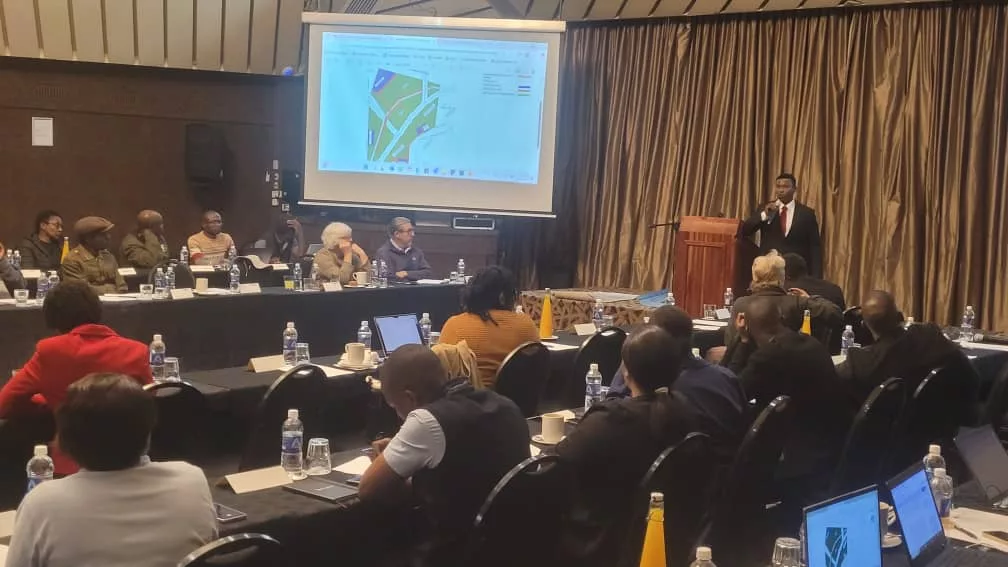|
Getting your Trinity Audio player ready...
|
By Spiked Staff Writer
Victoria Falls, 27 June 2025 – Speaker of Parliament, Hon Advocate Jacob Francis Nzwidamilimo Mudenda has called for urgent and sweeping reforms to Zimbabwe’s regulatory landscape to promote investment, streamline business operations, and make the country more competitive both regionally and globally.
Addressing the Zimbabwe National Chamber of Commerce (ZNCC) Congress in Victoria Falls yesterday, Hon Mudenda challenged business leaders, policymakers, and lawmakers to work together to create what he called a “business-friendly environment” that supports the country’s development ambitions under the National Development Strategy.
“Sustainable development hinges on a vibrant private sector that generates jobs, fosters innovation, and reduces dependency on aid,” Hon Mudenda said, quoting former Liberian President Ellen Johnson Sirleaf.
He warned that Zimbabwe’s current patchwork of laws and regulations creates high costs and excessive bureaucracy that stifle entrepreneurship and deter investors.
Zimbabwe is Open for Business’—But Challenges Remain
While praising reforms such as the “Zimbabwe is Open for Business” mantra and the adoption of the 2013 Constitution, Hon Mudenda pointed to many continuing hurdles for businesses. He singled out the Companies and Other Business Entities Act and the Zimbabwe Investment and Development Agency (ZIDA) Act as positive steps but urged business leaders to propose further amendments.
“If these Acts are still defective, proffer the necessary amendments through your corporate lawyers or our University Law Faculties,” he challenged delegates.
He cited the creation of Special Economic Zones under Statutory Instrument 226 of 2023 and the Cyber and Data Protection Act of 2021 as efforts to modernize the legal framework but stressed that many regulations remain fragmented and inefficient.
Regional Lessons and Stark Statistics
Drawing from regional best practices, Hon Mudenda urged Zimbabwe to learn from countries like Zambia, whose Business Regulatory Act has streamlined licensing procedures, and Botswana, which has successfully balanced regulation with business facilitation. He also praised South Africa’s use of regulatory impact assessments.
The Speaker warned that Zimbabwe is falling behind in competitiveness:
Zimbabwe has 9 procedures to start a business compared to 7.4 in Sub-Saharan Africa and 4.9 in OECD high-income countries.
The cost of starting a business in Zimbabwe is 76.6% of income per capita, more than double the Sub-Saharan average of 36.3%, and vastly higher than the OECD average of 3%.
Zimbabwe ranks 127th out of 141 economies in the 2019 Global Competitiveness Report.
It also has the third-highest compliance burden in Southern Africa.
“These competitiveness considerations demand that we consolidate our laws and reduce costs,” Hon Mudenda stressed.
Call for Legislative Action and Business Advocacy
The Speaker outlined multiple areas ripe for reform, including:
– Streamlining business registration by consolidating procedures under ZIDA’s One-Stop-Shop;
– Simplifying tax compliance by merging corporate tax, VAT, and PAYE into one omnibus law;
– Harmonizing labour laws and compliance requirements;
– Reducing duplication in licensing between agencies like EMA and local authorities; and
– Improving trade procedures to cut costs and delays in imports and exports.
He also highlighted opportunities for Parliament to act, urging the ZNCC to use its constitutional right to petition Parliament under Section 149 of the Constitution to propose new legislation or amendments.
“ZNCC must transition from mere compliance with current frameworks to becoming powerful advocates for business law consolidation,” he said.
Hon Mudenda also called on the business community to push for Zimbabwe’s ratification of the International Convention on the Settlement of Investment Disputes (ICSID Convention) to improve investor confidence.
Partnership as the Way Forward
Throughout his address, Hon Mudenda emphasized the need for partnerships between government, business, academia, and Parliament. He urged business leaders to work with universities, especially law and economics faculties, to develop reform proposals.
Citing voices from across the continent—including South Africa’s Thabo Mbeki, Nigeria’s Aliko Dangote, and Zimbabwe’s own Strive Masiyiwa—he underscored the idea that effective regulation should enable business, not constrain it.
“The regulatory state must act as a midwife to development, not its undertaker,” Mudenda declared.
He concluded by calling on the ZNCC and other stakeholders to seize the moment and help transform Zimbabwe into a preferred investment destination.
“Consolidated law must be the assuring instrument of socio-economic development. Succeed, you must!” he urged.
The ZNCC Congress, running from 25–27 June in Victoria Falls, drew senior government officials, business leaders, and policymakers determined to chart a new course for Zimbabwe’s private sector development.






